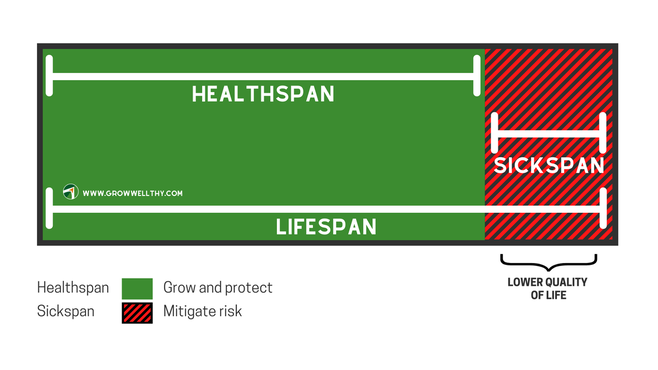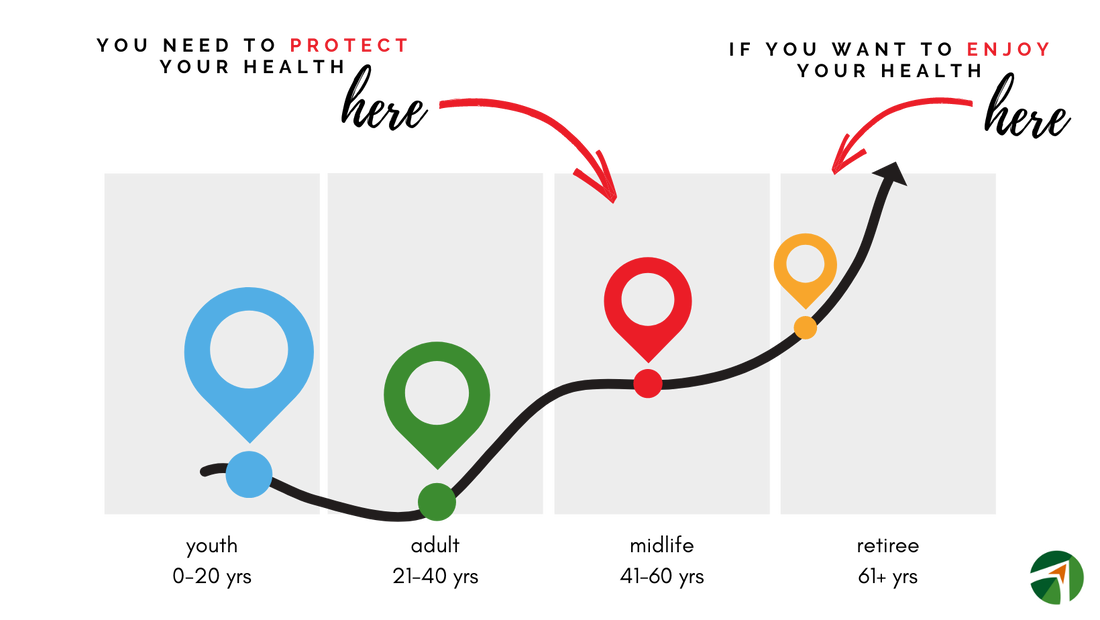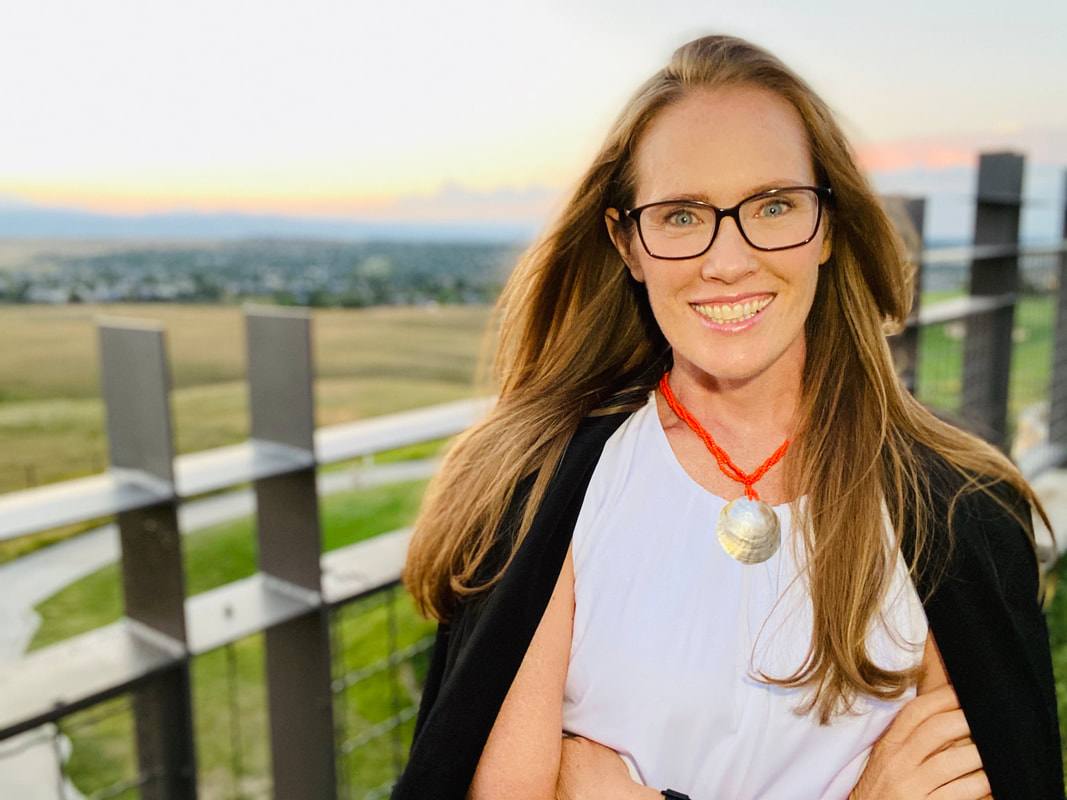“If you’re living, you want to be living well,” Advances in medicine have made it possible for people to live for years, and even decades, with chronic diseases that would have otherwise cut their lives short in the past. But is living longer the only goal for health? It seems like we might be setting the bar too low. When you ask most people, they hope to live for a long time because they want to see their grandchildren grow up, spend more time with those they love, and continuing doing activities that bring them joy. In their mind's eye they see themselves as active and able-bodied. What is Sickspan? The reality is that many of those in retirement years live with serious illnesses for a considerable amount of time. The average older adult globally spends 9 years needing significant medical intervention (1), and in the US it's closer to 12-16 years.(2) This gap between the end of good health and the end of life is what I refer to as the sickspan. Yes, people are benefitting from the wonders of science and living through their 80's and 90's, but it isn't exactly the vibrant, fulfilling life they imagined. Disease, pain, immobility, and reliance on drugs with major side effects keeps them from being able to go where they want to go or do what they want to do. What is Lifespan vs Healthspan? An article in Scientific American brought attention to this concept of "lifespan" vs "healthspan" in 2020.(3) It did a good job of distinguishing between a long lifespan which includes many years of life, and a long healthspan which includes many years of good health within lifespan. Another study done by Age Wave and Edward Jones in 2020-21 reported that 96% of retirees say that health is more important than wealth to live well in retirement.(4/5) The difference between the lifespan and healthspan is the quality of life. Many years ago, I heard someone say that she wanted to "live long and die short." That thought has stayed with me ever since. Isn't that what we all want? To live a happy, healthy life right up to the end where we die in our sleep? Of course we can't control exactly how end of life plays out, but it's sad to see so many people doing the opposite...living short and dying long. How Do You Improve Healthspan? Maintaining good health throughout a long life requires some attention and planning. In fact, in the same article I mentioned earlier, Andreana Haley, a psychology professor at the University of Texas at Austin, says that midlife (40 to 60 years old) is when "health choices have a big impact on older years." It's critical to lay the foundation of healthy habits during this window of time so you can maintain and protect your quality of life for the future. The process will feel a lot like preparing financially for retirement. But instead of making monetary deposits, you will be investing in things like your nutrition, movement, and stress management habits. When you have a plan in place for these different categories of healthy habits, keep track of how you are doing with a few key performance indicators. This could be how your clothes fit, how you feel, or what your blood tests say. One of the numbers I find valuable for my clients to keep an eye on is waist circumference. It's simple, accessible, and can provide a lot of insight into how their bodies are working on the inside. However you decide to go about it, good health is a worthy goal for retirement. All of the habits you establish now will add up over time to create a longer healthspan that you can enjoy for years to come. If you are interested in learning more about how to improve your health, please reach out to us here.
(originally published in 2020; updated April 2022)
References: (1) NPJ Regenerative Medicine Sept 2021: https://www.nature.com/articles/s41536-021-00169-5 lifespan vs healthspan gap 9.2 years (globally) (2) Washington University 2017: https://publichealth.wustl.edu/heatlhspan-is-more-important-than-lifespan-so-why-dont-more-people-know-about-it/ "we, on average, live up to 20% of our lives unhealthy" = 12-16 years is "sickspan" prior to death (US) (3) https://www.scientificamerican.com/article/brain-scientists-tap-secrets-of-staying-healthy-while-aging/ (4) 2020 AgeWave & Edward Jones study: https://www.edwardjones.com/us-en/market-news-insights/retirement/new-retirement The Four Pillars of the New Retirement 2020 (health, relationships, purpose, finances) (5) https://www.edwardjones.com/us-en/market-news-insights/guidance-perspective/does-health-span-match-wealth-span
Kari Brown
5/5/2022 06:22:46 am
I love the goal to 'live long and die short'! I believe until the pandemic as a society we did not give ourselves permission as a society to slow down and prioritize our mental and physical health. It seems like a blessing in disguise that the world came to a screeching halt allowing us to pause and reevaluate what life could look like.
Reply
5/13/2022 06:10:53 pm
I agree, Kari. It helped a lot of people re-evaluate their lives and make some needed adjustments.
Reply
Deb Gabriel
5/10/2022 03:21:35 pm
Thanks for the info. Sadly my waist circumference has gone up since 2020 -- need to whittle it back down before I retire.
Reply
5/13/2022 06:12:08 pm
It's understandable. I read a stat that the average weight gain during the pandemic was 29 lbs. Higher for millennials, lower for boomers.
Reply
Leave a Reply. |
AuthorI'm Stevyn... Categories
All
|









4/22/2022
6 Comments